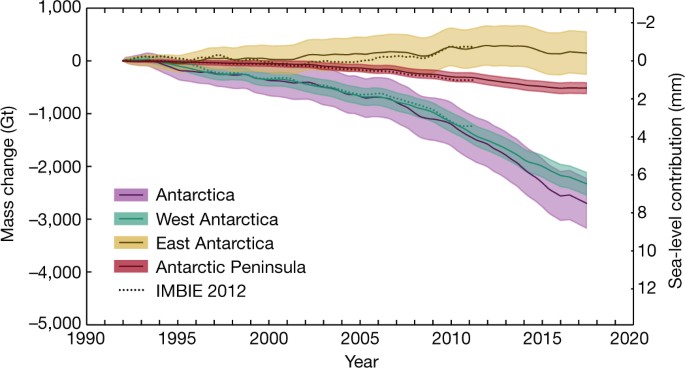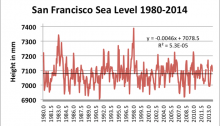- Joined
- Sep 15, 2013
- Messages
- 8,283
- Reaction score
- 4,095
- Location
- Australia
- Gender
- Male
- Political Leaning
- Liberal
"Oct. 7, 2014
Antarctic Sea Ice Reaches New Record Maximum"
Your main point seems to be that the actions of man have created conditions that will melt the Antarctic Ice Cap and this is simply not supported by real world facts.
In the real world, the greatest ice extent ever recorded in the Antarctic occurred in 2014. It may be only weather and not climate. Any one year is usually considered only weather.
Not only were you wrong about 2017, but I have to wonder why you chose to look at sea ice in the first place. Did you not realize that sea ice has no effect on sea level rise?
Or were you simply uncomfortable talking about the actual land ice sheets and hoping no-one would notice?
https://www.nasa.gov/press-release/ramp-up-in-antarctic-ice-loss-speeds-sea-level-rise
They attribute the threefold increase in ice loss from the continent since 2012 to a combination of increased rates of ice melt in West Antarctica and the Antarctic Peninsula, and reduced growth of the East Antarctic ice sheet.
Prior to 2012, ice was lost at a steady rate of about 83.8 billion tons (76 billion metric tons) per year, contributing about 0.008 inches (0.2 millimeters) a year to sea level rise. Since 2012, the amount of ice loss per year has tripled to 241.4 billion tons (219 billion metric tonnes) – equivalent to about 0.02 inches per year (0.6 millimeters) of sea level rise.
They attribute the threefold increase in ice loss from the continent since 2012 to a combination of increased rates of ice melt in West Antarctica and the Antarctic Peninsula, and reduced growth of the East Antarctic ice sheet.
Prior to 2012, ice was lost at a steady rate of about 83.8 billion tons (76 billion metric tons) per year, contributing about 0.008 inches (0.2 millimeters) a year to sea level rise. Since 2012, the amount of ice loss per year has tripled to 241.4 billion tons (219 billion metric tonnes) – equivalent to about 0.02 inches per year (0.6 millimeters) of sea level rise.
Ironically, this issue seems to have made headlines just yesterday.
https://www.businessinsider.com.au/...could-stop-catastrophic-sea-level-rise-2018-9
If the the glaciers holding back ice sheets in Antarctica and Greenland were to collapse, sea level rise rates around the globe would skyrocket.
This would quickly render the coastal cities where hundreds of millions of people live uninhabitable.
To prevent this, scientists are proposing a new kind of geoengineering plan to prop up the ice sheets with mounds or walls underneath.
These would be the biggest civil engineering projects in human history. . . .
This sort of “ice sheet intervention today would be at the edge of human capabilities,” the authors wrote in the study. But it’s possible that catastrophic ice sheet collapse could happen in the foreseeable future, and the processes that could trigger it at the Thwaites Glacier in West Antarctica — one of the most vulnerable glaciers — could already be happening.
“Thwaites could easily trigger a runaway [West Antarctic] ice sheet collapse that would ultimately raise global sea level by about 3 metres,” Michael Wolovick, a geosciences researcher at Princeton and the other author of the study, said in a statement.
If the the glaciers holding back ice sheets in Antarctica and Greenland were to collapse, sea level rise rates around the globe would skyrocket.
This would quickly render the coastal cities where hundreds of millions of people live uninhabitable.
To prevent this, scientists are proposing a new kind of geoengineering plan to prop up the ice sheets with mounds or walls underneath.
These would be the biggest civil engineering projects in human history. . . .
This sort of “ice sheet intervention today would be at the edge of human capabilities,” the authors wrote in the study. But it’s possible that catastrophic ice sheet collapse could happen in the foreseeable future, and the processes that could trigger it at the Thwaites Glacier in West Antarctica — one of the most vulnerable glaciers — could already be happening.
“Thwaites could easily trigger a runaway [West Antarctic] ice sheet collapse that would ultimately raise global sea level by about 3 metres,” Michael Wolovick, a geosciences researcher at Princeton and the other author of the study, said in a statement.
This particularly sensational proposal might be as much theoretical/publicity work as anything - perhaps - but "rapid, dynamical change" (as the last IPCC report called it) has always been the biggest plausible concern from Antarctica.



